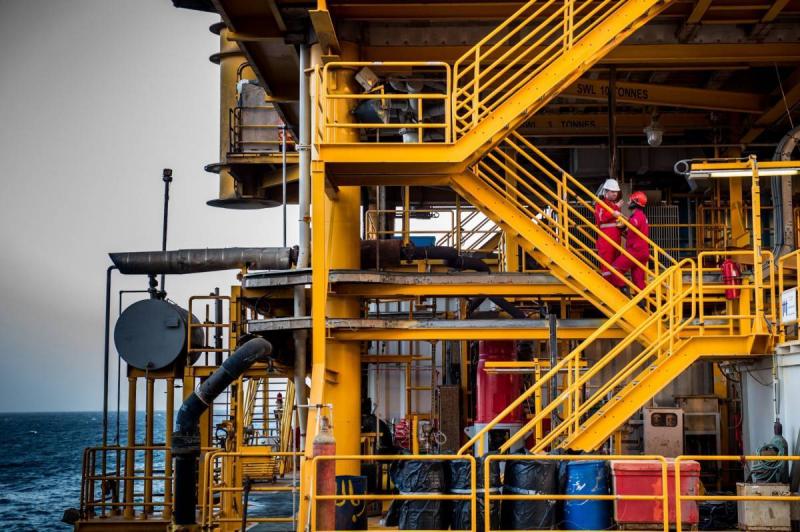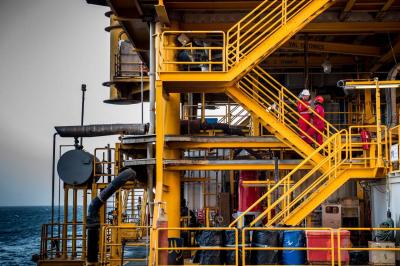Under the title "As U.S. Talks Progress.. Will the Markets Absorb the Anticipated Return of Iranian Oil?", Bloomberg Asharq published a report about Iran's readiness to increase its oil sales in global markets. Current negotiations with the United States regarding lifting sanctions show signs of progress; however, even if an agreement is reached, additional crude oil flow into the market may happen gradually. Officials stated that the Iranian National Oil Company is preparing oil fields alongside customer relations to boost exports in case an agreement is made.
In the most optimistic estimates, the country could return to pre-sanction production levels of nearly 4 million barrels per day in less than three months, and it could benefit from oil stored on shipping vessels. However, many obstacles remain to be overcome, particularly concerning the nuclear agreement. Any deal must fully dismantle the chain of U.S. restrictions on trade, shipping, and insurance involving Iranian entities. Even then, buyers may still be hesitant, according to Mohammad Ali Khatibi, a former official at the Iranian National Oil Company.
**Gradual Return**
Khatibi believes that the return may be gradual rather than sudden, noting that it cannot happen overnight. He stated, "It could be a lengthy process, partly due to the spread of the coronavirus pandemic that severely impacted demand." While Iran's return pace is crucial for the global oil market, fuel consumption is recovering but still low due to lockdowns and infections from mutated coronavirus strains. The additional Iranian supplies could burden counterparts in the OPEC+ alliance (which includes 10 countries alongside OPEC members), which has struggled for over a year to eliminate the surplus supply.
**Impending Agreement**
American and Iranian diplomats, who are currently negotiating through intermediary governments in Vienna, indicated that they are close to reaching a new agreement, which, if successful, could reactivate the international nuclear agreement from which former President Donald Trump unilaterally withdrew in 2018. This would require Iran to accept constraints on its nuclear activities again in exchange for lifting a set of strict sanctions imposed by the former U.S. president.
Tehran has already benefited from the less hostile climate ushered in by President Joe Biden's election and has begun reviving oil sales, sending a flood of Iranian crude to eager Chinese buyers, leading to a nearly 20% increase in production this year to 2.4 million barrels per day, the highest level in two years, according to data compiled by Bloomberg.
**Increasing Oil Production and Sale Capabilities**
Sarah Fachouri, head of the consultancy firm SVB Energy International LLC in Washington, stated, "Even if the sanctions are not lifted, they will increase their production significantly, depending on their ability to sell oil in the gray market.”
**Well Maintenance**
Engineers at the Iranian National Oil Company have conducted a rotation for crude production among various fields to maintain reservoir pressure at adequate levels, according to company officials who requested anonymity when discussing operational processes. This procedure is crucial for maintaining production levels; as Fachouri noted, gas injection in old oil fields in the south plays a similar role.
If an agreement with the United States is reached, Iran could increase production to nearly 4 million barrels per day within a period of three to six months, according to Iman Naseri, managing director for the Middle East at the consultancy FGE, which has decades of experience covering the region, including time spent in Iran.
Other observers expect a slower pace of return, as Reza Badidar, head of the Energy Committee at the Tehran Chamber of Commerce, explained in a phone interview that it would take 12 to 15 months after sanctions are lifted to increase production to 3.8 million barrels per day, adding that some work required to restore capacity in the fields, such as removing and maintaining blocked well pumps, could take a month per well.
**Chinese Stocks**
Even before an increase in production, Iran could achieve a rise in oil sales. Naseri from FGE estimates that the country may have stored about 60 million barrels of crude oil. Approximately 11 million barrels of this crude, along with an additional 10 million barrels of light oil (referred to as "condensates"), are in "customs storage" in China, typically stored to be ready for sale to end users, according to FGE.
Officials from the Iranian National Oil Company state they have maintained contacts with customers who are ready to resume regular purchasing agreements. Iran's re-entry complicates matters for the Organization of the Petroleum Exporting Countries (OPEC) and its allies. The alliance, consisting of 23 countries led by Saudi Arabia, is working to gradually restore oil production that was cut last year when the coronavirus outbreak affected demand.
Saudi Energy Minister Prince Abdulaziz bin Salman hinted that the group of producers would make room for Iran to increase production as it has done in the past, but it remains unclear if others in the alliance, including countries eager to restore production like Russia and the UAE, would accommodate it.
**Difficult Talks**
As the bargaining process between Tehran and Washington continues to secure better terms, reaching an agreement may take longer. If recent attacks and incidents in the Arabian Gulf escalate into open hostilities, the opportunity for an agreement could slip away entirely. The negotiations are also influenced by upcoming elections next month, after which Iranian President Hassan Rouhani will step down. While Supreme Leader Ayatollah Ali Khamenei has supported the negotiations thus far, Rouhani’s successor may take a tougher stance against the United States.
Even if sanctions are lifted, Iran faces other issues. Khatibi mentioned that refining companies likely signed annual contracts earlier in the year, leaving limited space for Tehran to secure its own long-term supply agreements at this time. He added, "Our biggest concern is the restrictions placed on our customers and their fear of buying oil from Iran. As we approach the end of the year, we will witness more contracts being signed during that period."
Badidar, an official at the Tehran Chamber of Commerce, complained that Trump’s sanctions "squeezed" Iran's relations with traditional customers, including India, China, South Korea, Japan, and Turkey, more than previous rounds of trade restrictions.
For many in the market, from Wall Street banks like JPMorgan Chase & Co. to trading firms like Vitol Group, demand for oil is recovering quickly enough to comfortably absorb additional Iranian barrels. Since the rapid distribution of vaccines helps end lockdowns, pent-up travel demand will increase consumption in the second half of this year. Mike Muller, head of oil trading in Asia for Vitol Group, the world's largest independent oil trader, said, "There is room for the return of oil from Iran, but it won’t come all at once."




